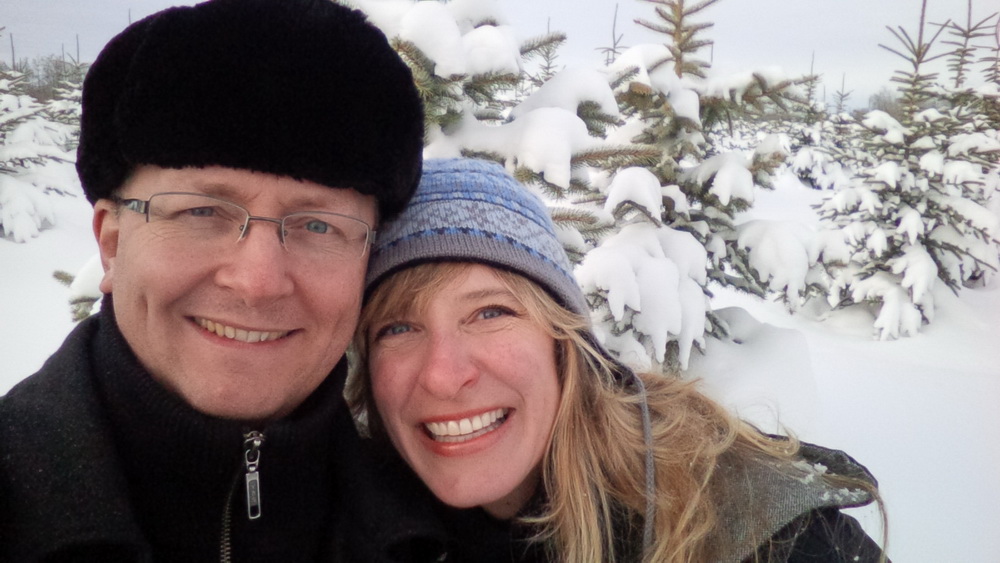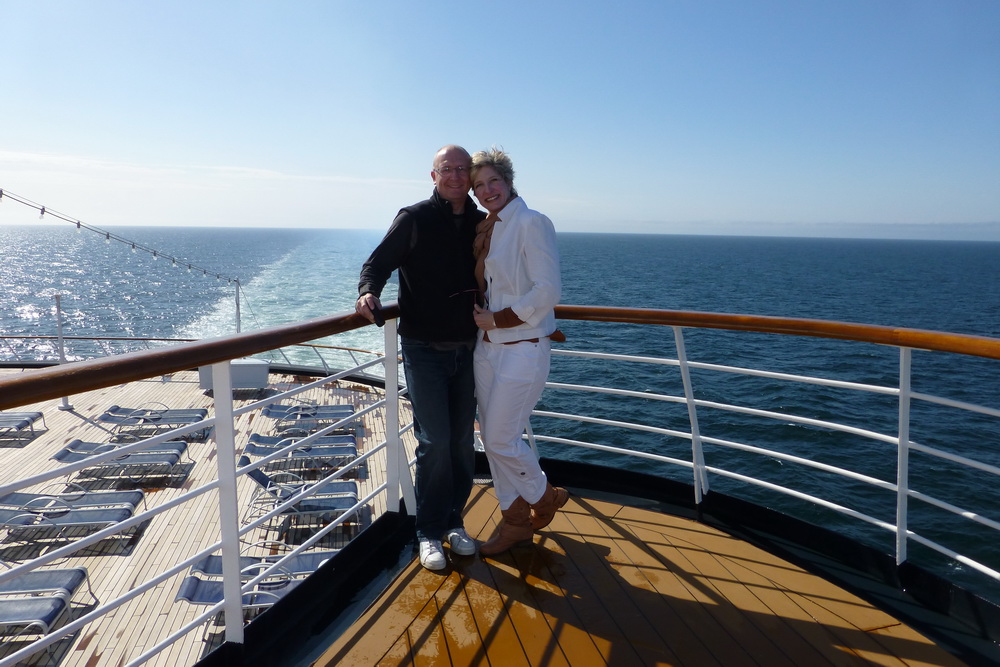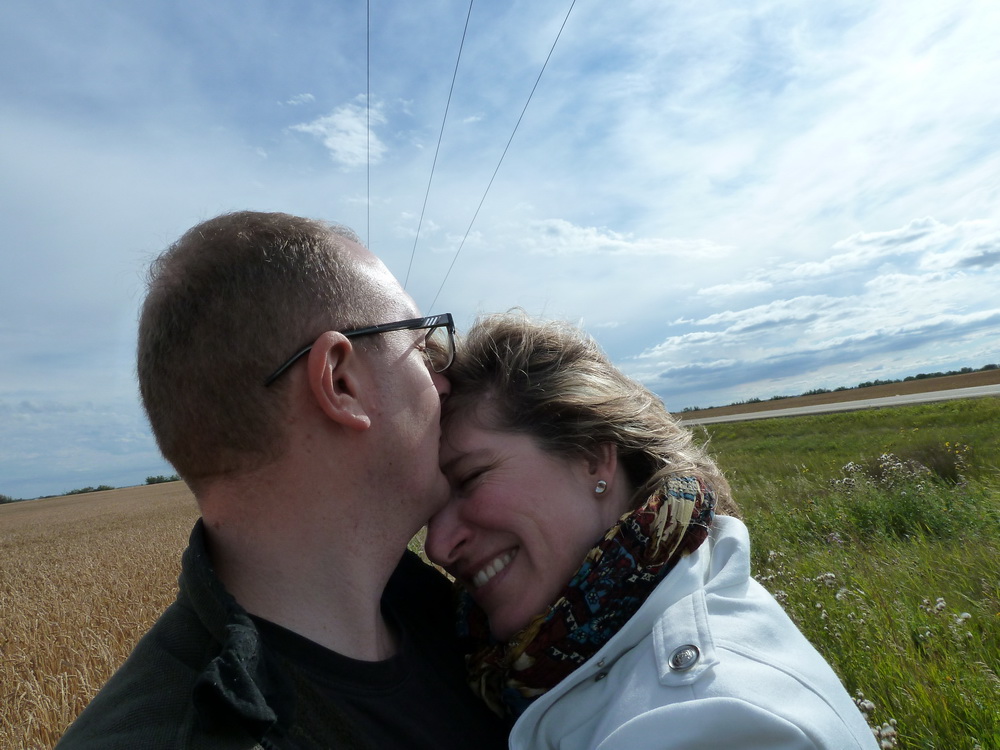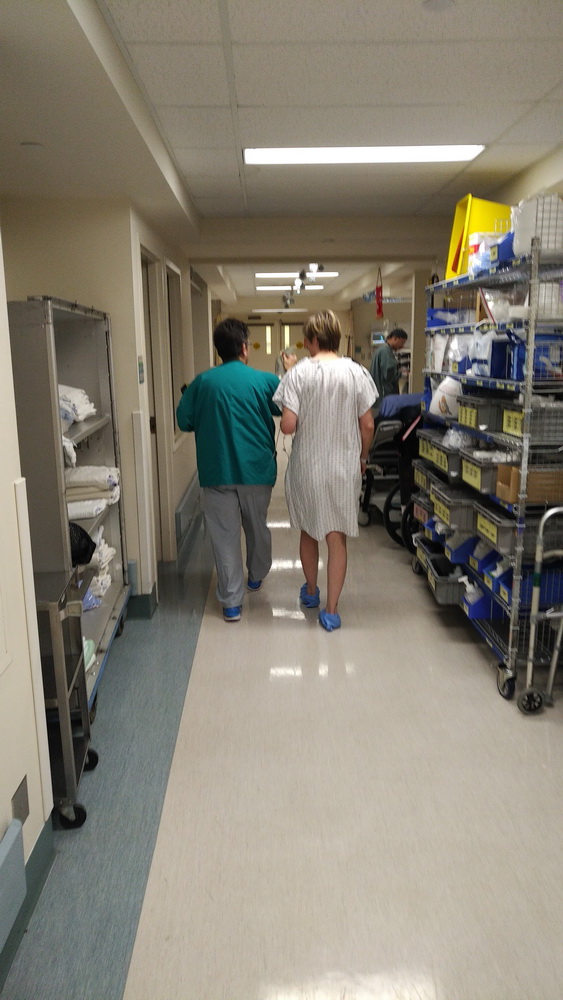Caroline S. was no stranger to hearing loss, seeing her mom struggle throughout her life. After hearing aids were no longer helping her hear, she became more isolated from her husband and family, and was struggling to do her job. When she was referred to get cochlear implant surgery, she was ready for new opportunities in life.
“I am Caroline S., and I live in Edmonton, Canada with my beloved husband, Andreas. He is the most supportive husband, and I am so grateful for his love and help through all the years of my hearing journey. I have a box of tissues next to me as I write this. Hearing loss is emotional. Remembering what we have been through is important and even beneficial, but it also churns up many sad and sometimes unpleasant, painful memories, but that is in the past. Now we can focus on gratitude, and all the beautiful things to hear in our world. Life is so much better with sound.
When we found out that I was a candidate for a cochlear implant, we started a podcast to chronicle my journey, and what an unbelievable journey it has been! Andreas calls me ‘My Beautiful Cyborg’ and that is the name of our podcast too. Mostly it is just the two of us yapping it up about what it is like to struggle with hearing loss, and what it is like to have cochlear implant surgery and get a cochlear implant (click here to listen to Caroline’s podcast).
Family hearing loss
I grew up having family with hearing loss, as my Mom is profoundly hearing impaired. We kids learned that we needed to face Mom and speak clearly, moving our lips in an exaggerated fashion if we wanted her to understand. I learned lip-reading by accident as everyone in the family had the ability to communicate without making sound if we needed or wanted to with our lip-reading skills. I remember being frustrated as a child with my Mom’s deafness, knowing it was not her fault, but being frustrated just the same. I came home from school tired and hungry on many occasions and I could see Mom in the family room vacuuming, but she could not hear or feel my knocking (pounding!) on the door, or hear the doorbell to let me in. I would be in tears with frustration by the time she realized I had been out in the rain waiting to get inside.
I knew Mom’s hearing impairment was genetic; her grandmother, aunts, mother, and sister all suffered from hearing loss to various degrees, so it was no surprise when newlywed, at the young age of 21, I needed my first pair of hearing aids. I also knew that this genetic loss was progressive and my hearing would only ever get worse.
Hearing aid frustrations
Sadly, like most hearing aid users, for the first several months I carried my hearing aids around in my pocket. I am ashamed to think of that now, but it is difficult to get used to hearing aids and learning to filter out unwanted noise is an acquired skill. It takes effort and energy and the brain needs to work hard at it.
I worked in a hotel restaurant and I remember ‘bill’ and ‘milk’ sounding identical. ‘Wheat’ and ‘white’ (toast) also sounded exactly the same. I remember bringing a guest oatmeal at breakfast; he looked at me like I was insane and said ‘I didn’t order that. I asked for an omelet.’ I was mortified and the next day I started wearing my aids full time. Using hearing aids became the norm; it was just the hand life had dealt me. There were worse things after all.
As the years went by, we upgraded and boosted power/volume as my hearing degenerated. I suppose I am rough on hearing aids, since we lead an active lifestyle and since my work is physically demanding. Moisture is hard on aids and I suppose I sweat a lot. My aids would last five years max because the circuitry would fail, or the glue on the faceplate would deteriorate and it would fall off. Does that sound expensive? It is.
Eager to find a new solution for hearing loss
Technology had come a long way and I started wearing digital hearing aids. My last set of digital hearing aids were a huge disappointment for the entire five years I used them. The quality of sound never seemed to do the trick for me. There seemed no escape from the mumbling and poor audio I was getting. My hearing was getting SO bad. I was astonished to realize that I no longer heard consonants and was making up more than I was actually hearing.
Still…we knew something had to be done. In May of 2017, I went to a hearing center, where the kind and compassionate audiologist saw my agony; I was losing touch with people. My life was shrinking. She saw my pain and asked if she could do further testing. Afterward, she asked if I would mind if she referred me for a cochlear implant! I was thrilled there was another option apart from another pair of aids to provide me with noisy mumbling. Hallelujah! There was hope!!!
Something I learned during my referral experience is the difference between a hearing aid practitioner and an audiologist. I wish I had gone to see an audiologist many years earlier. Hearing aid practitioners are interested in selling hearing aids to those who benefit from them; it took an audiologist to recognize that I had reached the end of that road. For that, I cannot be more thankful.
Nervous about cochlear implant surgery
My cochlear implant surgery date was set for December 12, 2017. It is a date you do not forget, just like a birthday. Andreas and I were not blessed with children, so this is the closest thing we have experienced to having a baby…hahahaha…all you parents must be rolling your eyes. But, I can imagine the anticipation leading up to cochlear implant surgery is a little like the anticipation of expecting a child. You are eager to get through the difficult part and eager to ‘meet’ this new life. I was terrified to hope. That is the truth.
Despite statistics, despite being an ‘ideal candidate’, and despite how BAD my hearing was, there are no guarantees about outcomes, and I wanted SO BADLY to hear. I desperately wanted to be able to connect with people again, but I was afraid to hope for good hearing.
I remember feeling scared on the morning of my last work shift before my cochlear implant surgery. I was teary and nervous and just a bag of tension. The few days prior to surgery were seriously stressful. I wanted to be calm and cool, but my emotions were raw and I confess that I was freaking out. All this was unnecessary of course, but that is the truth.
Day of cochlear implant surgery
The day of the cochlear implant surgery, I felt like I was sleepwalking on the way to the hospital. Everyone there was fantastic and compassionate and I loved seeing my surgeon in the OR. Seeing him was comforting and reassuring and reminded me that I was in good hands. Falling asleep was not a problem and when waking up, my first words to Andreas were ‘it’s in’ and we both smiled broadly, tears streaming down our faces.
The first few days post-cochlear implant surgery were kind of a blur. Andreas set me up very comfortably in the living room in our big cushy chair. My pain medication was fantastic and it worked incredibly well for me. I had a huge appetite and slept very well. Eating and sleeping so well seemed to help with my recovery, and my pain was very manageable. It took about a month until I could sleep on my right side. Each individual is different, but my post surgery experience was quite easy. Many folks have even less discomfort than I did and mine was minimal.
The few days leading up to activation were both exciting and full of restless nerves. I was so eager to get the work started and begin my hearing rehab! Activation day was festive! I chose my outfit carefully and treated myself kindly the morning of my appointment, using a special bath bomb and trying desperately to relax a bit. This was the first day of the rest of my life.”
Read to see how Caroline S.’s activation day and beyond went on our blog, publishing January 24, 2019!





